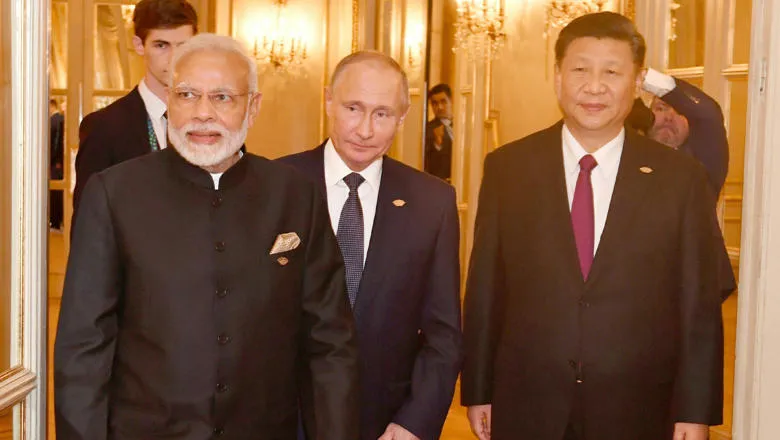The 2025 Shanghai Cooperation Organisation (SCO) Summit, held in Tianjin, China, saw a record number of participating countries, marking a significant moment in global diplomacy. We asked our experts to assess what the three main players, China, Russia and India, gained from the event, and how these developments may reshape the international landscape.

The 2025 Shanghai Cooperation Organisation (SCO) Summit, held in Tianjin, China, saw a record number of participating countries, marking a significant moment in global diplomacy. The summit comes at a pivotal time, as the isolationist and nationalist rhetoric U.S. President Donald Trump's administration has contributed to a growing discontent toward the United States, particularly among nations in the Global South. China is keen to seize this opportunity to expand its influence on the world stage and promote an alternative global order.
Two countries central to this effort are India and Russia. The presence of Indian Prime Minister Narendra Modi and Russian President Vladimir Putin at the summit served as a powerful symbol of unity and strategic alignment, sending a clear message to the United States and other G7 nations about the shifting dynamics of global leadership.
To better understand the outcomes and implications of the summit, we asked experts from King's to assess what each country gained from the event and how these developments may reshape the international landscape.
China
Professor Kerry Brown Director, Lau China Institute
Of course, of all the parties at the SCO China is the largest player, economically, militarily, and geopolitically. So the optics of Xi hosting this group, which after all constitutes almost a half of the global population, was great for China's claim to be a major power, and the only true competitor to the US. They even had the bonus of an irritated message on Truth Social from President Trump complaining about them gathering to conspire against the US. For Xi, though, the main challenge going forward will be how to avoid being mired in the demands and claims of others the same way that the US ended up being. China is a huge economy, but a parsimonious one, and it will not welcome any calls on its resources to become something like a global policeperson in the same way as the Post World War US has been. The military parade therefore was for show only. This is a 100 per cent untested, pristine equipment. And I suspect that the true intent of Xi is to use this for psychological pressure, to ensure the day China has to wade into the battle field is a long way off - and perhaps will never have to happen.
Russia
Professor Gulnaz Sharafutdinova, Director of King's Russia Institute
The recent SCO summit in Tianjin and the military parade in Beijing highlight the evolving contours of a shifting international order-one increasingly shaped by rising powers such as China, India, and Russia, who are challenging the dominance of the traditional global hierarchy. These events send a clear message of strength and unity from the Global South to the United States and other advanced industrialised nations of the G7. They also suggest that, for countries like China and India, the broader geopolitical realignment takes precedence over the Russia-Ukraine conflict. US President Trump's trade war and nationalist rhetoric have only deepened the collective opposition among these rising powers, providing fertile ground for Russia to frame its war in Ukraine as part of a larger confrontation against the West.
In pragmatic terms, Russia secured a series of economic and energy agreements with China, including an agreement to build a new Power of Siberia 2 gas pipeline, commitments to expand bilateral trade in local currencies and further develop infrastructure projects under the Belt and Road framework. These deals provide Russia with vital economic lifelines in the face of Western sanctions and strengthen its long-term strategic partnership with Beijing.
India
Professor Christophe Jaffrelot, King's India Institute
The rapprochement we are witnessing between India and China is now possible because India has resigned itself to seeing China encroach on its territory in the Himalayas and come to the aid of its public enemy number one, Pakistan.
This may be seen as only a modest shift, given that New Delhi has already been collaborating with Beijing for years within the BRICS, a coalition aimed at challenging Western dominance on the international stage. Some will therefore see a real continuity between this anti-Western tradition and the current Sino-Indian convergence, at a time when the entire Global South (of which these two countries - like Russia, another pillar of the BRICS, claim to be the leaders) is mobilising against Donald Trump's protectionist diktat.
This does not prevent the beginning of a real break, as India has never so easily resigned itself to Chinese domination. This resignation risks becoming a structural feature of the international scene, as it can be explained both by the military superiority of the Middle Kingdom and India's dependence on it, a fact with serious geopolitical consequences
This is an extract from Christophe recent article in The Wire.
Time will tell how these relationships evolve under mounting external pressures. Will the strain forge a stronger alliance, or cause the bonds to fracture? One thing is certain: the world will be watching closely.






